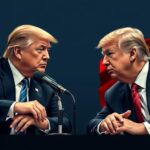China’s Counteractions to US Tariffs: A Comprehensive Overview
China has retaliated against US tariffs by imposing import duties on coal, LNG, agricultural machinery, and vehicles. These measures, along with anti-monopoly investigations and the designation of US companies as ‘unreliable entities,’ demonstrate Beijing’s strategy to protect its economy while sending a strong message. The impact of these tariffs on both economies may be modest given that most of China’s imports come from other sources.
The ongoing trade conflict between the United States and China has intensified following the implementation of new tariffs by both nations. In response to President Trump’s 10% tariff on all Chinese imports, China has devised countermeasures targeting specific American products, including fossil fuels and certain machinery. Since 2018, this tit-for-tat exchange has escalated, raising concerns about the implications for both economies.
To counter US tariffs, China has introduced import duties, including a 10% tax on US coal and liquefied natural gas (LNG) and a 15% tax on crude oil. Although China is the leading coal importer globally, it sources most of it from Indonesia, with US imports comprising a minor portion of its overall fossil fuel trade. Analysts suggest that China can easily find alternative suppliers, notably Russia, mitigating potential economic impacts from the tariffs.
In addition to energy products, China has also targeted US agricultural machinery, pick-up trucks, and large cars with a 10% tariff. However, the significance of these tariffs may be limited since China mainly imports cars from Europe and Japan and has increased domestic production investments. According to Julian Evans-Pritchard of Capital Economics, these tariff measures total about $20 billion of annual imports from the US, which is negligible compared to the $450 billion worth of Chinese goods affected by US tariffs.
Moreover, China has initiated a non-tariff response by launching an anti-monopoly investigation into Google. While the details of this investigation remain unclear, Google has been largely absent from the Chinese market since 2010, contributing minimal revenue to the company. This measure appears aimed at demonstrating China’s assertiveness against US companies.
China has also included the American brand Calvin Klein on its ‘unreliable entities’ list due to accusations of discriminatory practices against Chinese firms. This designation could lead to increased scrutiny and operational challenges for these companies in China, akin to the US entity list that limits certain Chinese organizations from engaging with American businesses. Professor Andreas Schotter notes that these retaliatory measures reflect the growing economic decoupling between the US and China.
In a further escalation, China has imposed export controls on 25 rare metals, critical for various technologies and military applications. The majority of the world’s refined output of these metals is produced in China, positioning the country strategically. Notably, key US imports critical for high-tech manufacturing have not been targeted, suggesting a measured approach in China’s response strategies.
The trade war between the United States and China has evolved over the past few years, with both countries imposing tariffs on each other’s goods. This ongoing dispute has been characterized by targeted fiscal measures and aggressive tactics by both nations, reflecting deep economic tensions. As the world’s two largest economies find themselves in conflict, the implications of these trade actions are far-reaching, impacting global supply chains, market dynamics, and international relations. China’s response to US tariffs has included a variety of strategies, both direct and indirect, highlighting its desire to shield its economy while remaining competitive on the global stage. The targeted tariffs serve not only as a retaliation but also as a method to bolster domestic industries and lessen dependency on US imports. The developments in this trade bout are closely watched by other nations, given their potential to trigger global economic shifts and alterations in trade policies worldwide.
In summary, China’s countermeasures against US tariffs involve a combination of import taxes on specific goods, measures against US companies, and strategic export controls. Although these actions aim to mitigate the effect of US tariffs, analysts believe that their overall economic impact may be limited. The continued back-and-forth illustrates the tension between the two global powerhouses, threatening not just their bilateral relationship but also global economic stability.
Original Source: www.bbc.co.uk







Post Comment